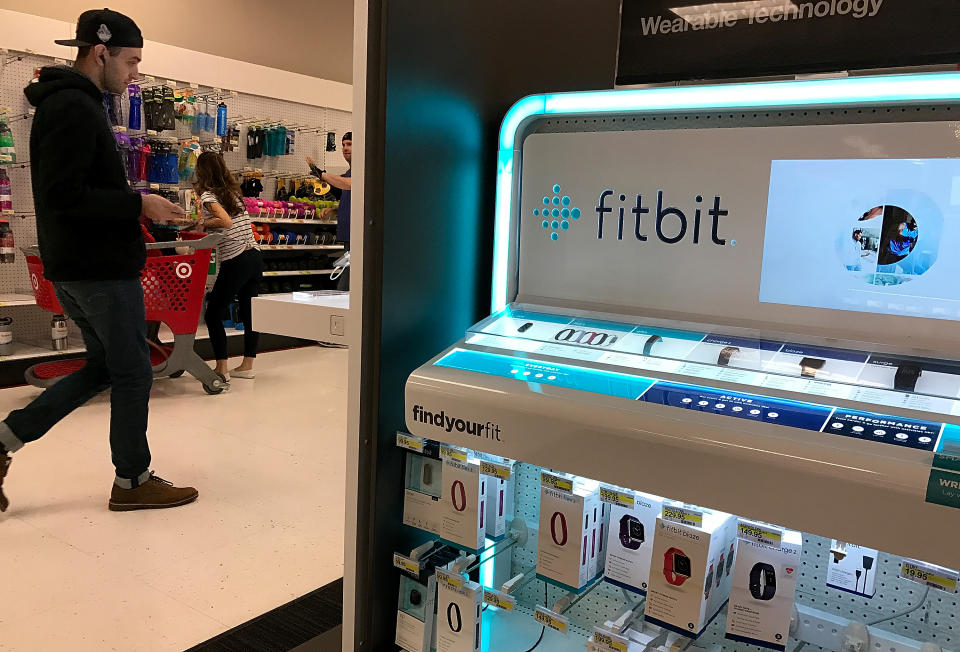What everyone is forgetting about in Google's $2.1 billion deal for Fitbit
Are you kidding me with all these feel good vibes around Google’s “big” $2.1 billion acquisition of Fitbit.
Lets temper that cheerleading a touch, folks.
Google's parent company Alphabet said Friday it will acquire health tracking company Fitbit for $2.1 billion — or $7.35 a share — in cash. The news follows multiple reports recently that the two firms were set for a tie up.
Fitbit (FIT) surged 17% in early trading on the news. Alphabet (GOOG) was up 0.4%.
The deal by the deep-pocketed Google for Fitbit makes a degree of sense for the tech beast. For starters, Google obtains sensitive data on how human beings live their lives and their overall health journey. With populations globally getting older and incomes for many classes of people going up, Google could use that data on Fitbit’s 28 million active users to build out new subscription health services.
Or, to build entirely new hardware devices.
At the very least, Google will have another layer of data that helps it to position its current suite of offerings — from the cloud to smart home devices to Waymo — even more correctly in an ever-changing world. Data is the lifeblood of a tech animal such as Google — and over time paying $2.1 billion for Fitbit’s innermost precious commodity may prove to be a steal.
Fitbit’s plastic fitness trackers and smartwatches are a mere afterthought here, let’s be real. The wearable space is effectively owned by Apple despite what Fitbit tracker loyalists think.
But the elephant in the room here is the massive shareholder value destruction at Fitbit through the years.
Fitbit’s health has been in decline
Fitbit’s stock hit a record high of $48 or so in July 2015, not too far removed from its June 2015 IPO. Back then, optimism was running high on the wearable space and Fitbit was seen as the market leader as the Apple Watch had only just gotten off the ground.
Fitbit’s stock fell slightly below $3 in late August of this year. Its market cap has gone from $6.4 billion in December 2015, according to Yahoo Finance Premium data to Google’s offer price of $2.1 billion. That’s awful.
The company’s profit margins have been shredded due to the greater popularity of the Apple Watch. New entrants have also come into the picture and by and large, Fitbit hasn’t done enough to maintain its once formidable lead. The company’s smartwatches haven’t truly taken off and its fitness trackers could now be found on sale at Kohl’s (among others).

A recent pivot to offering health solutions looks promising, but wasn’t going to lead to an earnings boom in the next year or two.
Said value destruction could be pinned on the two co-founders that sit on Fitbit’s management team and board of directors — James Park and Eric Friedman. That structure speaks to everything that’s wrong with some tech companies — outsized influence of big thinking founders and the willingness of boards of directors to give them a pass and to be memorized by grand ideas.
Why wasn’t this business sold a year ago? Two years ago? Three years ago?
A good number of Fitbit’s management team and board has been in place throughout the era of value destruction. Two new board members added since 2018 likely provided badly needed fresh ideas on Fitbit and the pressing need to sellout before it was too late.
Memo to tech companies: more diversified boards, more diversified management teams are needed in this day and age. And you must have a greater appreciation for when the stock market is telling you that you are failing.
Kudos to Park and Friedman for finally getting paid. The same likely can’t be said for the Fitbit shareholders who have been on the tech company’s post June 2015 IPO journey.
Yahoo Finance’s tech editor Dan Howley contributed to this story.
Brian Sozzi is an editor-at-large and co-anchor of The First Trade at Yahoo Finance. Follow him on Twitter @BrianSozzi
Read the latest financial and business news from Yahoo Finance
SmileDirect co-founder: here’s what life will look like post IPO
Starbucks CEO on what China has in store for the coffee giant
Follow Yahoo Finance on Twitter, Facebook, Instagram, Flipboard, SmartNews, LinkedIn, YouTube, and reddit.
